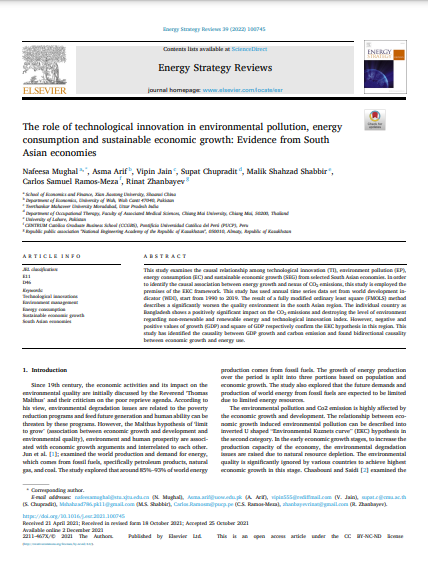
Keyword(s)
Author(s)
Nafeesa Mughal, Asma Arif, Vipin Jain, Supat Chupradit, Malik Shahzad Shabbir, Carlos Samuel Ramos-Meza, Rinat Zhanbayev
Publisher
Published Date
Access
DOI
This study examines the causal relationship among technological innovation (TI), environment pollution (EP), energy consumption (EC) and sustainable economic growth (SEG) from selected South Asian economies. In order to identify the causal association between energy growth and nexus of CO2 emissions, this study is employed the premises of the EKC framework. This study has used annual time series data set from world development indicator (WDI), start from 1990 to 2019. The result of a fully modified ordinary least square (FMOLS) method describes a significantly worsen the quality environment in the south Asian region. The individual country as Bangladesh shows a positively significant impact on the CO2 emissions and destroying the level of environment regarding non-renewable and renewable energy and technological innovation index. However, negative and positive values of growth (GDP) and square of GDP respectively confirm the EKC hypothesis in this region. This study has identified the causality between GDP growth and carbon emission and found bidirectional causality between economic growth and energy use.
Cite:
Nafeesa Mughal, Asma Arif, Vipin Jain, Supat Chupradit, Malik Shahzad Shabbir, Carlos Samuel Ramos-Meza, Rinat Zhanbayev, The role of technological innovation in environmental pollution, energy consumption and sustainable economic growth: Evidence from South Asian economies, Energy Strategy Reviews, Volume 39, 2022, 100745, ISSN 2211-467X, https://doi.org/10.1016/j.esr.2021.100745.